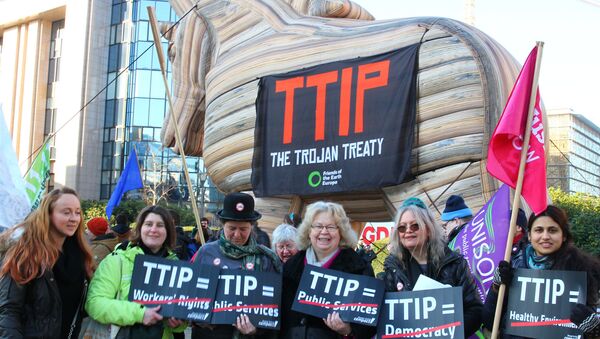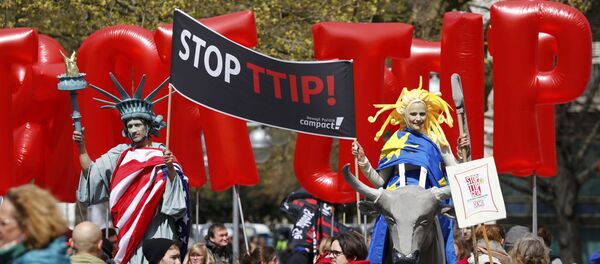"The conditions for this deal have not been agreed yet. And taking into account the current situation, I can say, they will not be agreed until the end of the year. In particular, France sees as insignificant Washington’s proposals on the access to the US market for European products. The proposals would offer no benefits for the European economy," Desir said.
According to him, there are several "red lines" that cannot be ignored in the text of the document.
Matthias Fekl, Minister of State for Foreign Trade, underscored that the negotiations have stalled due to Washington’s stance on the issue.
"We cannot allow the infringement of our national interests," Fekl said.
In theory, such an agreement would presume elimination of mutual tariff and non-tariff barriers to ease access to the markets. Currently, average customs tariffs between the US and the EU are three to four percent and the removal of customs barriers would not increase trade.
What is more important, the deal presumes lifting administrative and regulatory barriers. These norms are much stricter in Europe than in the US. If Europe removes them it would open its market for American goods.
The document has been criticized as being designed to open the doors to other markets for US transnational corporations.
If the EU signs the deal nearly 600,000 Europeans will lose their jobs, European goods will not be able to enter the US market, exports will decrease and EU countries will lose income, Jeronim Capaldo, a research fellow at the Tufts University, wrote.
Earlier this year, the German newspaper Suddeutsche Zeitung reported that the US mounted strong pressure on Europe over the TTIP deal. In particular, according to leaked documents, Washington threatened to create difficulties for exports of European cars to the US if Brussels rejected to buy more American agricultural products.
"The US aggressively protects its market by unilateral regulatory quotas on imported products, from agricultural products to cars. Those quotas are set for the entire EU so a separate EU country cannot get guarantees that its products will enter the American market," Georgy Vaschenko, head of operations at the investment company Freedom Finance, told the Russian online newspaper Vzglyad.
The US has also opposed replacement of arbitration courts with transparent national commercial courts to settle trade and investment disputes.
"The agreement includes several provisions declaring the priority of US investors over the legal norms of European countries. At the same time, EU companies don’t have the similar rights in the US," Nikita Kulikov, executive director at Heads Consulting, pointed out.
As a result, cheap meat products containing hormones would flood the European market, destroying local businesses.
"If the deal is signed French domestic companies will face major losses. The French government will face a tough choice – to further cut social programs and abandon high environmental standards or put up with the losses of domestic companies," Kulikov pointed out.
The deal will have negative impact on the entire European farming industry and may also affect the European engineering industry, Anna Kokoreva, senior analyst at Alpari, said.
According to her, the deal is more advantageous for the US because it would eliminate the barriers which make American products noncompetitive in the European market.






